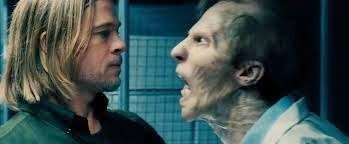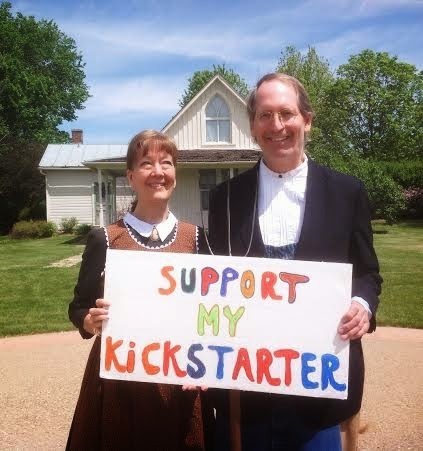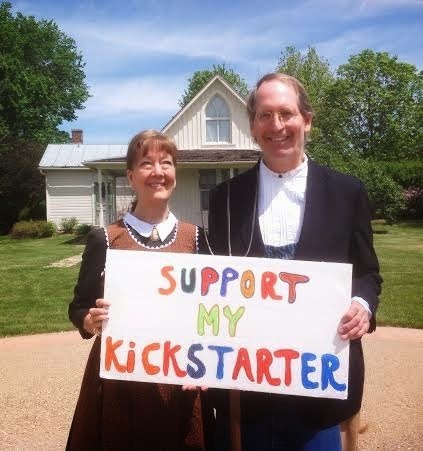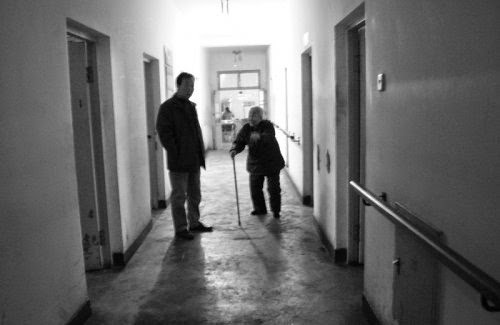Tom Kepler's Blog, page 20
July 4, 2014
A Day Out with Mom #27: The Lunchbox, Hard Hat, Cookie Story
 That cookie good? You always liked cookies.
That cookie good? You always liked cookies.When you were little, four or five, I worked up the Feather River canyon when they were building the power houses. Every morning I'd get up early and leave, and your mom would cook breakfast and pack my lunch. Remember my lunch box, the black one with the brass rod that slips through the eyes to lock it shut, the one where the Thermos fits into the top part? We still got it in the shop? Imagine that . . . it's over fifty years old!
So I'd go to work every day, that long drive, eat my lunch at break time. It was hard work. For a while I drove the explosives truck, delivering the powder to the power house and road and tunnel sites. Your grandpa talked me into getting another job, though, one less dangerous. I drove a "Uke" for a long time, a great big dump truck, it was.
And then I'd come home and there you were at the door, waiting for your dad. You'd put on my hard hard and take my lunch box, every day. That hard hat would fit down almost to your shoulders, it seemed, but you'd tip it back and sit on the floor, slide out that brass locking rod, open the lunch box, sort through the wax paper, and find a cookie. Then you'd grin up at me and bite into that cookie.
I'll tell ya, no matter how hungry I was at lunchtime, I'd never eat that cookie, no matter what. Once was enough to come home and see you rip open that lunchbox and not find that cookie. The look on your face!
No matter how hungry I was, I'd leave that cookie for you. It wasn't the only thing I came home for, but it sure as hell was one of 'em. Seeing you eating that cookie just brings back the memories.
Copyright 2014 by Thomas L. Kepler, all rights reserved
Published on July 04, 2014 04:05
June 21, 2014
Movie Review: World War Z
 A zombie that is dead can't be infected.
A zombie that is dead can't be infected. Brad Pitt is trying to save his family from a zombie pandemic that is sweeping the world. Once bitten, in twelve seconds the victim is a zombie. This leads to some powerful visuals of the infection spreading, but even a slight sense of scientific skepticism casts a pall on the reality-building efforts of the production.
However, it being a rainy day and I being somewhat tired, I persevered and finished the movie.
The best moments are the narrow escapes and the brave few who hold out against overwhelming swarms so that the even fewer might escape and perhaps endure. Brad Pitt's character is one lucky dude, escaping attack after attack in his world-spanning search for a "zombie solution." Meanwhile, small enclaves hunker down, stay quiet, and hope the zombies stay "dormant," which shouldn't be too hard for the undead, especially since they don't seem to feed.
Let's see--dead but animated, energy out but no energy in, can't get sick but keep on kickin' . . . A science-based "solution" doesn't seem to be the best way to end this movie, but with a willing suspension of disbelief, one can at least sit back and watch characters prevail (for mankind), characters in the end a lot more lucky than the actors portraying them.
I've been trying to be reasonable, though, and I guess the real truth is this: what am I doing trying to apply reason to a zombie movie? I might as well try, when the sun sets, to keep the vampires at bay by converting my house's lights to full-spectrum lightbulbs. Makes sense, but, hey . . .

Copyright 2014 by Thomas L. Kepler, all rights reserved
Published on June 21, 2014 05:00
June 14, 2014
I Successfully Lose a Writing Contest
 The writers' blog Indies Unlimited hosts a weekly writing contest from a prompt they provide--250 words max. I wrote about my entry into the contest on my last blog post.
The writers' blog Indies Unlimited hosts a weekly writing contest from a prompt they provide--250 words max. I wrote about my entry into the contest on my last blog post.I lost.
However, I'm writing today about how I feel good about the results. Yes to Success and all that.
First, I wrote a short story that is set in my Dragons of Blood and Stone universe. Every time I enter that universe, I feel good. So far so good. Also, the fact that the story might fit into my collection of short stories, Tales from the Stone Dragon Inn, is an extra plus.
Second, I feel my little experiment with social media marketing was successful. Because I was busy early this week, I didn't see the voting post at Indies Unlimited until 4:30 AM on the deadline day. By the time I posted my mini-marketing blog post, it was 5:00 AM--allowing 10 hours for marketing my entry for support.
Facebook marketing came later that morning--status updates on my personal Facebook account and on my Tom Kepler Writing page. I also sent a Facebook note to a dozen Facebook friends.
The results? Twenty percent of the votes, the winner receiving 23%, with most of the winner's votes already on tab at 4 AM that morning. Now, the 10 possible hours for voting for me were from 5 AM to 3 PM on a Thursday, my time here in Iowa. I deem my hurry-up mini-marketing adventure a success.
Thanks for all who supported me. Since the Indies Unlimited writing contests are fairly informal (the winners are published in an anthology), I didn't want to push the marketing envelope too much--just enough to see if anybody out there is paying any attention.
People did pay attention. That makes me glad. Thank you, all.
Copyright 2014 by Thomas L. Kepler, all rights reserved
Published on June 14, 2014 06:00
June 12, 2014
I Enter a Fun Flash Fiction Contest (How's That for Alliteration?)
 I've entered a writing contest, winners determined by reader votes.
I've entered a writing contest, winners determined by reader votes. Every week the independent publishing blog for writers, Indies Unlimited, has an informal flash fiction contest for its readers. You can vote on the winner, voting deadline today, 5 o'clock PM Pacific time.
A writing prompt of text and photo is provided, and the submission must be no more than 250 words. I submit a story every now and then when a prompt gives me an idea that will fit into a story that could be used in a collection of stories I'm writing set within the Dragons of Blood and Stone fantasy series. When I finally gather enough short stories, I'll publish a collection titled Tales of the Stone Dragon Inn.
Winners are determined by vote, so I'm giving my readers here a chance to read some short, short stories, to observe some writers having fun, and to provide you a chance to vote on your favorite story. Sorry this is such short notice, but I've been busy taking education classes for a couple of days.
This week's topic was "The Great Dessert Riot."
Here's the link to the voting blog post. That link also provides a link to the contest short stories, which are in the comments section.
Have fun. My entry isn't titled, but I'll call it "Piety" if I use it for my short story selection. Enjoy.
Copyright 2014 by Thomas L. Kepler, all rights reserved
Published on June 12, 2014 02:39
June 4, 2014
Congratulations to Greg Thatcher's Crowd-funding Kickstarter Project and Its Supporters

With the help of Greg Thatcher's friends, patrons of the arts, and lovers of England's sacred yew trees, the crowd-funding Kickstarter project that I wrote about last week has achieved its funding level. Success! Congratulations to all who participated in this effort.
Greg's project goal was the following:
One month intensive drawing in Painswick, Gloucester, UK. The goal is to finish a detailed drawing, and research galleries in the UK .
The "Plein Air" video above provides, for me, all the reasons why it is so good and meaningful that this project has met its financial Kickstarter goal and has been funded. We should all be proud to be supporters of such a good endeavor.
As Greg says in the video, "These trees deserve to be honored." We have just given the means to do so to an honorable man.
Copyright 2014 by Thomas L. Kepler, all rights reserved
Published on June 04, 2014 09:36
May 29, 2014
Greg Thatcher's Vision: Support an Artist and the Sacred Yews of England
 Welcome to a wonderful opportunity to patronize the arts--in the real sense of the word--by becoming a parent to the artistic process.
Welcome to a wonderful opportunity to patronize the arts--in the real sense of the word--by becoming a parent to the artistic process.This is how it worked in the old days when those with the means provided seed money for artistic endeavors. Now even we commoners can be patrons of the arts by providing seed money via the Kickstart program. One artist in particular, Greg Thatcher, is using the Kickstart program to fund his continuing artistic and spiritual relationship with the ancient yew trees of England. The great thing about this program is that anyone can help fund this project, the "Plein Air" of the Sacred Yews, if you've got at least a buck to kick in.
Greg Thatcher's Kickstarter project goal is to spend one month of "intensive drawing in Painswick, Gloucester, UK. The goal is to finish a detailed drawing, and research galleries in the UK."
At the Kickstarter site, "Plein Air" of the Sacred Yews, Greg describes his project:
I have been working on a series of "plein air" yew tree drawings since 1991 based on the topiary yew trees in St. Mary's Churchyard, Painswick, Gloucestershire, England.
Last summer, I began a new "plein air" drawing and clocked in 130 hours on location in Painswick. The drawing is about half-way finished. With your help this summer, I want to return to England and complete the drawing. I also plan to continue searching for suitable gallery representation as well as press coverage to help raise awareness about my work and the significance of yew trees.
 The Kickstarter site describes his "unique, generous rewards program" that includes prints of his work. The site also includes a video showing the beauty of the Painswick, UK, area and the incredible yew trees. My wife and I are excited about receiving some prints and are already looking at the walls and wondering where in the house to mount Greg's art.
The Kickstarter site describes his "unique, generous rewards program" that includes prints of his work. The site also includes a video showing the beauty of the Painswick, UK, area and the incredible yew trees. My wife and I are excited about receiving some prints and are already looking at the walls and wondering where in the house to mount Greg's art.Making a donation was as easy as buying something from Amazon--in fact, it was an Amazon "purchase"--very easy and simple.
Part of my motivation to sponsor Greg for this project is his articulation of the relationship between the artistic subject, the process of creating art, the inner life of the artist, and the experience of viewing art. At his website, Greg Thatcher Gallery, he writes the following:
The direct experience of an artwork is primarily an internal experience, based solely upon our level of consciousness and our mental impressions and past experiences. Experiencing an artwork with openness can provide us with direct contact with our deeper selves and, at times, a beautiful epiphany that reaffirms the divine. This is my goal, and I hope that you will experience some of the joy, inspiration, beauty and raw primal forces of nature that I experienced while drawing.I've known Greg as a teacher and friend for almost ten years. What I admire about him is his dedication to his art and how as a teacher he is able to model for his students what it means to live the life of an artist, of how refining one's artistic vision is not only an evolution of one's art but can also be a process that leads to personal growth. Greg walks the talk.
His art is beautiful, and since he's going to England, I feel free to quote Keats: "Beauty is truth, truth beauty,—that is all /Ye know on earth, and all ye need to know."
Become a patron of the arts. Provide seed money for the advancement of art--and, therefore, truth. It's money well spent. Funding Greg Thatcher's "Plein Air" of the Sacred Yews project will add beauty to the world. I feel better because of my donation. As of this blog post, only six days are left for the funding. Now it's your turn.

Copyright 2014 by Thomas L. Kepler, all rights reservedPhotos and art copyright by Greg Thatcher, used with the author's permission
Published on May 29, 2014 04:14
May 27, 2014
Finally Time to Garden
 The Chinese have a saying: Do not miss the planting time. Time year I'm right on target. Go, Keplers!
The Chinese have a saying: Do not miss the planting time. Time year I'm right on target. Go, Keplers! Last year I missed our garden time because I was in California taking care of my parents. This year I'm getting the chance to really garden--every day if I want to and not just squeezing time in outside of work. The garden is a nice place to be--and we're trying to make as much of our year a garden as possible. This year rabbits and robins are hanging around. Wait a minute--that's every year!
A lot of the early work was weeding and re-digging beds for the crops. Last year I was not only gone, but it was also a year of drought. The cool and wet spring this year has provided a slow entry into the garden season. It has warmed, though, so almost everything we plan to grow is in the ground.
peasturnip greensAsian greensbeet greenslettuce (black-seeded Simpson)cilantrodillbasilperennial garden herbsarugulachardkalewinter squash (3 varieties)potatoesgreen beans (pole and bush)zucchini and yellow summer squashcantaloupeasparagus (5th year)okrasweet potatoestomatoes (small and large)Brussels sprouts shallots
 Baby robin, somewhat confused
Baby robin, somewhat confused Greens on the east side of the yard
Greens on the east side of the yard Momma rabbit, not wanting to use the gate at her rightI think that's it for the veggies. Our raspberry patches are looking good, and we transplanted volunteers to make a third patch for future years. We have just planted two pear trees and have ordered two apple and two plum trees that we'll plant in a couple of weeks. It' a great joy to spend time in the garden with my wife. It's a great joy to put my hands in the soil and to see the plants growing.
Momma rabbit, not wanting to use the gate at her rightI think that's it for the veggies. Our raspberry patches are looking good, and we transplanted volunteers to make a third patch for future years. We have just planted two pear trees and have ordered two apple and two plum trees that we'll plant in a couple of weeks. It' a great joy to spend time in the garden with my wife. It's a great joy to put my hands in the soil and to see the plants growing.It is definitely work to plant this much garden, but it is also a joy to walk out to the garden, harvest asparagus, and then steam it and eat it immediately. Now, that's fresh food!
 We also grow flowersThe preparation is now done, and the rest of the summer will consist of maintaining the garden and processing food for the winter. So far so good! Below are some more photos of the garden.
We also grow flowersThe preparation is now done, and the rest of the summer will consist of maintaining the garden and processing food for the winter. So far so good! Below are some more photos of the garden.Copyright 2014 by Thomas L. Kepler, all rights reserved
Published on May 27, 2014 17:34
May 20, 2014
Retirement, Writing, and Routine
 When I decided to retire, I knew I wouldn't have any problems keeping busy or finding purpose in life after teaching. My experience has confirmed my feelings. In truth, I have been so busy that I've had the opposite situation: rather than wondering what of significance to do, I've been given too much of significance to do!"
When I decided to retire, I knew I wouldn't have any problems keeping busy or finding purpose in life after teaching. My experience has confirmed my feelings. In truth, I have been so busy that I've had the opposite situation: rather than wondering what of significance to do, I've been given too much of significance to do!"In Boyd Lemon's book Retirement: A Memoir and Guide , he writes the following:
"The books that I read on philosophy, religion, self-help and new age theories made me appreciate, intellectually, that I didn't need to achieve any longer. I never needed to, except in my mind. But I had not internalized this new understanding either."I'm going to look at "achieve" as those powerful benchmarks of activity that had structured my personal and work life--those activities that structured my time and attitude. The thing is, all those "structures" became more fluid in retirement. As I said to one friend, "It's great to wake up and think, 'I need to do this today . . . but on the other hand, I can do it tomorrow.'"
A great deal of "have to do" pressure was taken off my shoulders with retirement, yet also a familiar routine was also lost--a routine that provided the ease of familiarity. For me, the loss of routine has been especially true. One month after submitting my resignation letter to my school, I was unexpectedly pulled two thousand miles away to care for my elderly parents. Out of the first year of my "retirement," I spent eight months caring for my parents, my private space and bed the living room sofa.
What has been the result of this experience regarding my goals and my routine, two aspects of retirement Lemon Boyd considers in his book as key to successful retirement?
My retirement did not fulfill the sense of ease from responsibility that I had been expecting.My retirement did not easily lend itself to establishing a new routine.My retirement did not allow me to follow the goals I had expected.There are no sour grapes to taste here. I am glad to have helped my family, I eventually established a routine that was good for me, and I found myself writing about my experience with my family and will shape those writings into a book.
I'm back home now. I stayed with my parents for almost seven months and have visited them for two-week stays twice now over the last six months--about once every three months. So what about retirement, writing, and routine?
Like Lemon Boyd, I realize now that intellectual understanding is not the same thing as experience--understanding the concept is not the same thing as living the reality.
My retirement responsibilities are still significant, yet they are also less stressful in that they are not so time dependent.When and what I choose to write is much more open in terms of my daily routine. I don't have to pressure myself and squeeze in the time to write. I just have to choose what my routine is going to be. I have to best structure my days to fit all my responsibilities and goals into the day.The pace of achieving my goals can now be more relaxed. Rather than taxing myself, body and mind, to achieve my goals, I can now pace myself to move forward at a rate that is nurturing to both myself and to those significant in my life.This blog post is a part of this week's first goal--to re-establish a sense of "30-minute" marketing, to set aside a portion of time each day to highlighting my writing for the reading community, including both the books I've written and my reflections living the life of a writer. I've been working at least a half an hour early each morning.
What are my next goals?
writing time on specific projects--fiction and non-fictiongardeningtime with familybicyclingI see no need to prioritize these. I also haven't included reading time because, for me, that would be like including time for breathing. It just happens.
It's spring, though, and the planting time. Gardening has taken a big role in my activity right now. That's appropriate. Family time has mostly centered on weekends with wife and family and two afternoons during weekdays babysitting my grandson. I'm not counting wonderful evenings with my wife, though. Those, like breathing, just happen . . . and just happen to be an essential part of my life's happiness.
Writing project time? Most likely just before or after lunch. Bicycling? I'm thinking maybe significant rides three days a week.
See? There's still some fluidity, the sense of "achievement" has mellowed, yet I still have some goals that are meaningful and that I need to structure into my activity.
Today, I've written these words which have helped me internalize the new structure of my life. It's still early, I take care of the grandkid this afternoon, and I've got some work in the garden. I can stop before lunch to take some time on A Day Out with Mom, the non-fiction book I'm working on. I also have some short stories I want to re-work.
What I don't finish today I'll work on tomorrow. It's a more relaxed pace and a good feeling to have lost--at least, mostly--that 8-to-5 knot that was once the coiled reptile in my stomach.
I can do without that and still have a lot to do.
Copyright 2014 by Thomas L. Kepler, all rights reserved
Published on May 20, 2014 04:09
April 19, 2014
A Day Out with Mom #26: an ideal visit
 As Mom an I enter Dad's room, a physical therapist is getting him into his wheelchair.
As Mom an I enter Dad's room, a physical therapist is getting him into his wheelchair."I need you to sit up and swing your legs to the edge of the bed. No, don't grab onto me and pull. I'll push your back some if you need it."
I can see the method being used that was discussed last week in the three-month review: to emphasize those movements and modalities needed to live in a wheelchair.
"On which side of the bed do you want your wheelchair, the head or the foot?"
"It doesn't matter," Dad responds. The head-side is chosen by the therapist, who is a middle-age man, stocky and strong.
"Now scoot more to the middle of the bed. That's it. More. Now scoot more out toward me to the edge of the bed."
Dad follows the instructions. I can see how thin his legs are, but he does the job and takes satisfaction in doing it.
"I'm going to put this safety strap around your waist before we move to the wheelchair."
The therapist removes the four-inch nylon strap from around his waist and secures it to Dad, creating a strong gripping point for himself. Making sure Dad's feet are correctly positioned, the therapist reviews for Dad the procedure: Dad will stand and swing himself over to the chair and then sit.
With a pull to help Dad stand, the transfer begins, ending with Dad sitting down on the narrow end of the wheelchair's arm, his swing to the chair too short.
"Stand again, and we'll swing you on down into the seat," and Dad slips down into the chair's seat. "Are you OK? That arm is pretty narrow." Dad affirms he's OK, but his frame is so emaciated, I wonder. I suppose his continence pad acts as a buffer.
"I want to see how well you can move your wheelchair. Let's move out into the hall. You can use either your feet or your hands."
Dad uses mostly his hands and arms, lifting his feet. We move toward the inner courtyard. The therapist leaves us at the door. It's a wonderful spring mid-morning, no wind, plenty of sunshine, and flowers blossoming and green grass.
We sit in the sunshine. I return to Dad's room to get his baseball cap. I'm asked to sign a form at the nurses' station saying that Dad's bed has been placed with one side against the wall to lessen the chance of his falling.
 "Ahh, the sun soaks right through you," Dad says as I grab chairs for Mom and me. I snap a few photos. Then an aide snaps a few that include me. The bright light bothers Mom, so we move to the edge of the shelter so that Mom and I can sit in the shade and Dad can sit in sunlight.
"Ahh, the sun soaks right through you," Dad says as I grab chairs for Mom and me. I snap a few photos. Then an aide snaps a few that include me. The bright light bothers Mom, so we move to the edge of the shelter so that Mom and I can sit in the shade and Dad can sit in sunlight. We talk. Mostly I talk, actually, and Dad responds with nods and short comments. I move him a little into the shade and then a bit more into the sunlight a little later. Dad scratches at his back and shoulders. Mom listens and interacts as best she can with her deafness.
"Everything's itching. The sun's getting everything moving."
"Do you want to be more in the shade?"
"No, the sun feels good." Dad smiles a small, satisfied smile, one that never leaves his face.
He drifts some into a sleepy haze of warmth and comfort. I keep talking to focus his attention and keep him awake. He asks the usual questions: where is Mom living, how is the car doing, how much money is in the bank. I talk about how my brother and I have painted the mobile home, how the roses are blossoming, and how my brother has not come this time because he is painting the six-foot decorative metal windmill that Dad erected in the front yard years ago: yellow and green, Iowa colors. Dad had bought the windmill on a trip to visit me in Iowa years ago. I can tell as I explain that he does not remember.
We have a long stay, an hour and a half. Dad does not want a drink of water. He is a little tired, so I push him when we go back into the facility. Of the four doors into the building, Dad knows one connects to the physical therapy room but has the particular door wrong. When we enter the doorway closest to his room, Dad says, "This is where I eat." He has trouble keeping his feet up as I push him along. The therapists remove the foot platforms on the wheelchairs to encourage more mobility. I move slowly because Dad's feet keep dropping to the floor where they can then pinch under the chair.
We don't return all the way to Dad's room. It is noon and soon lunchtime, so the head of the nurse's station backs Dad against the wall. "You can watch us work here for a bit and make sure we're doing everything OK," she jokes, moving up closely to Dad as she speaks.
Mom and Dad kiss and tell one another their love. Some sadness always is included in the parting, but there are no tears, is no anger. We leave. Mom has talked some. Dad has talked some. I have gladly done my song and dance, entertaining and reporting.
I wonder how it works when I am gone and my brother is in my place--I the English teacher and my brother the carpenter and construction worker, especially since my dad's dementia tends to slide toward negativity with my brother. I suppose they get by. I know I've told my brother to just keep his distance if necessary. When he and I have come together, my brother brings roses to the staff. It's a good strategy, I think.
Today has been pretty much a perfect visit. Dad's frailty is evident, yet it is also evident that the professional care is keeping him safe and as engaged as Dad is capable. I saw on the wall that a patients' family survey assigned the facility two stars out of five for its work. I think that's rather low from what I've seen. Most of Dad's quality of life is determined, as far as I can see, by the self-imposed boundaries of his mental and physical frailty. Certainly having someone--or several support staff--with Dad twenty-four hours a day would be preferable to keep him stimulated, but such an arrangement is possible only for the most affluent.
My feeling that two stars rather than three--I think the facility is doing and OK job--in part is determined by the grieving of families involved. We would all like the situation to be better, something more than "brutal," as Dad put it. We structure our own world, and Dad has spent a life often judging relationships as being a glass half empty. He can't help himself now.
In our weakness, our frailties and challenges become more evident and significant. It is for us, the stronger, to understand, to adapt, to cope. I give myself the freedom to grieve, the freedom to sometimes feel human anger, the freedom to feel glad that I am still healthy. Somebody's got to be the functioning adult. Thank God I've still got it in me. I intend to use it till the cows come home.
Copyright 2014 by Thomas L. Kepler, all rights reserved
Published on April 19, 2014 05:00
April 16, 2014
A Day Out with Mom #25: brutal is the dying of the light
 "It's brutal," Dad says, referring to his residential care residency.
"It's brutal," Dad says, referring to his residential care residency.He is lying in his bed, alone, covered with a blue institutional thermal blanket.
I have just come from Dad's regular three-month review with the review team. His weight has dropped another two pounds. He is eating about 38% of his meals and at about 65% capacity in his ability to move from bed to wheelchair or from wheelchair to bathroom facility.
"I just don't know why I ended up in this place."
I tell Dad once again the story of his pneumonia and the collapse of his strength. I tell him that his strength has not come back, even with physical therapy. He is too weak to take care of himself, I tell him.
I take the chance to tell him the truth. Maybe if I can tell him--even as compassionately as possible--enough times, he will be able to remember and accept and adjust.
"Being old can be a misery," I tell him.
"Yes, it can," Dad says.
"Actually, being young can be a misery, too."
Dad laughs. "That's true."
"I guess you've just got to have the right attitude."
I go on to tell him we'd love to have him home, but we've got to keep everybody safe. It's nobody's fault. He's just old and weak.
"Yeah, ya get that way with time. Sneaks up on ya."
He thanks me for coming and is so sincere. I tell him I'm glad to help in any way I can, and I can hear the sincerity in my voice, too.
I acceptance in both our voices.
* * *
As I am writing this, Mom has woken and has come and sat beside me on the sofa. She sits to my right so I can speak into her left ear, the one that still retains 12.5% hearing capacity, boosted to about 25% by her hearing aid.
We are talking about Dad and she asks if he said he wants to come home. "We had an honest conversation," I say.
"This has been so hard on me," she says. "It's hard on my heart. Who knows how long any of us will last? They've changed my heart medicine."
I remember Mom quoting the doctor she worked with when she was young: "You're born, you live, you die."
All we can do is choose what seems the best path and dance our footsteps dusty as often as we possibly can.
* * *
It is evening at home. My brother and Mom are asleep, and I am watching a movie.
The phone rings and I answer it.
Dad says, "Come and get me."
"We can't bring you home, Dad. You're too weak."
"I'm not too weak, goddammit. Now come and get me." I hear the rage and hang up.
Mom has woken, coming into the kitchen where I am with the phone. "Who is it?"
I lie: "Someone trying to sell something." She wanders back to bed, satisfied.
Or maybe I'm not lying. Maybe it wasn't Dad cursing me but Somebody Else. It wasn't a good ending for Dad and lousy closure for me, but Mom was spared some hurt. One out of three ain't bad, even if we're not playing baseball.
* * *
I slip in to see Dad this morning and wake him from sleep. He asks me to come another day, too let him sleep. There is no indication in his voice of any remembrance of last night's tirade.
Maybe it was Somebody Else.
Copyright 2014 by Thomas L. Kepler, all rights reserved
Published on April 16, 2014 05:00



